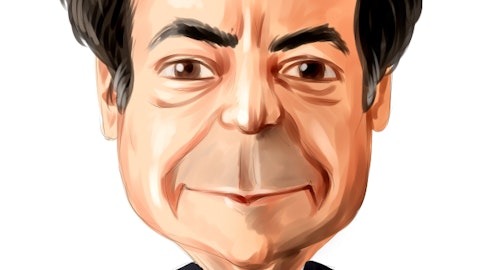Bill Ackman founded his Pershing Square in 2003. The New York-based hedge fund typically takes activist roles in its investments. This means that Ackman builds large positions then pushes to increase shareholder value in the company. This could mean getting a more effective leader installed at the helm of the company, like he did in moving for ex-Apple exec Ron Johnson to get elected CEO of JC Penney Co (JCP) (read about it here), while other times it means that Ackman pushes for the company’s split, like in the case of Kraft Foods (KFT) (read more here). In fact, Ackman has such a strong reputation for being successful as an activist investor that share prices tend to go up when he invests in a company, like when announced his involvement with Fortune Brands (FO) (find out more here).

Ackman’s strategy is to look for stocks with long-term value potential when the market shifts to undervaluing the stocks. He tends to chose well-known brands and typically invests enough to form some degree of an insider interest; point in fact, right now Ackman serves on 7 corporate boards. Ackman also keeps a relatively narrow focus in his investments, spreading Pershing Square’s interests evenly between consumer goods, financial and services stocks.
Ackman has a history of strong performance. His Pershing Square gained almost 30% in 2010. The fund’s performance in 2011 was not nearly as high – he actually lost almost 2% for the year – but his performance was better than most. Last year the average hedge fund lost roughly 4%. There certainly was no love lost from investors. According to a 13F for the fourth quarter filed on February 14, his Pershing Square had 21 positions collectively valued at $7.78 billion, up in value from $6.03 billion at the end of the third quarter.
The largest of these holdings was a stake in Canadian Pacific Railway (CP) valued at $1.63 billion, or 24.15 million shares. During the fourth quarter, Ackman upped his stake in CP Rail significantly from the mere 4.04 million shares he held at the end of the third quarter, valued at $194.29 million. CP Rail was trading at $73.17 when the markets closed on February 16 on a one-year target estimate of just $70.73 (range $61 to $92.19). It is priced at 14.49 times its future earnings and pays a $1.17 dividend (1.60%). BB&T Capital Markets downgraded the company on January 18, from a buy to a hold rating. Ackman is confident CP Rail will turn things around. He thinks the company just needs the right person at the helm. Ackman has spoken out openly against current CEO Fred Green and has been pushing for ex-Canadian National (CNI) CEO Hunter Harrison to take the lead (read about it here). Ackman is willing to go so far as to wage a proxy war, and no wonder. Canadian National’s numbers are fantastic compared to CP Rail’s. Canadian National was trading at $76.95 when the markets closed on February 16, and it carries a mean one-year target estimate of $80.53 (range $66.14 to $89). The company is also priced lower relative to its future earnings, with a forward P/E of 12.91, and it pays a higher dividend of $1.50 (1.90%). We would invest in CP Rail for the simple fact of Ackman’s involvement (and his track record of success), but looking at just the numbers, Canadian National is the stronger company. It is easy to see why Ackman would be courting the man who turned Canadian National around for CP Rail.
The second largest holding in Pershing Square’s portfolio at the end of the fourth quarter was JC Penney (JCP). Ackman had $1.36 billion in the department store at the end of December, or 38.72 million shares. The number of shares in the Pershing Square portfolio did not change but the value of the position did significantly. Ackman’s stake in JC Penney was valued at just $1.04 billion at the end of the third quarter. When the markets closed on February 16, JC Penney was trading at $41.96 a share on a mean one-year target estimate of $39.93 (range $29 to $50). It pays an 80 cents dividend (1.90% yield) and is priced at 19.43 times its forward earnings. The upside on JC Penney right now is debatable, but the company is in the process of a turnaround. We think that, between Ackman’s efforts and Johnson’s, JC Penney will bounce back. In any case, JC Penney is certainly positioned better than rival Sears Holding Corp (SHLD). Sears was trading at $54.86 when the markets closed on February 16. It has a mean one-year target estimate of just $19.50 (range $6 to $27) and it does not pay a dividend. Given its numbers, a forward P/E was not available for the stock.
At the end of the fourth quarter, Ackman was also bullish about Kraft Foods (KFT), Citigroup (C), Family Dollar (FDO), Beam (BEAM) and Fortune Brands (FBHS). We like Citigroup the most among these stocks. The stock has a 2012 forward PE ratio of 8.1 and analysts expect the stock increase its earnings by around 9% annually. These numbers point to a very attractive investment. We believe analysts are underestimating because of concerns about the European debt crisis. We think Citigroup can double over the next three years as growth accelerates and PE multiples expand.





